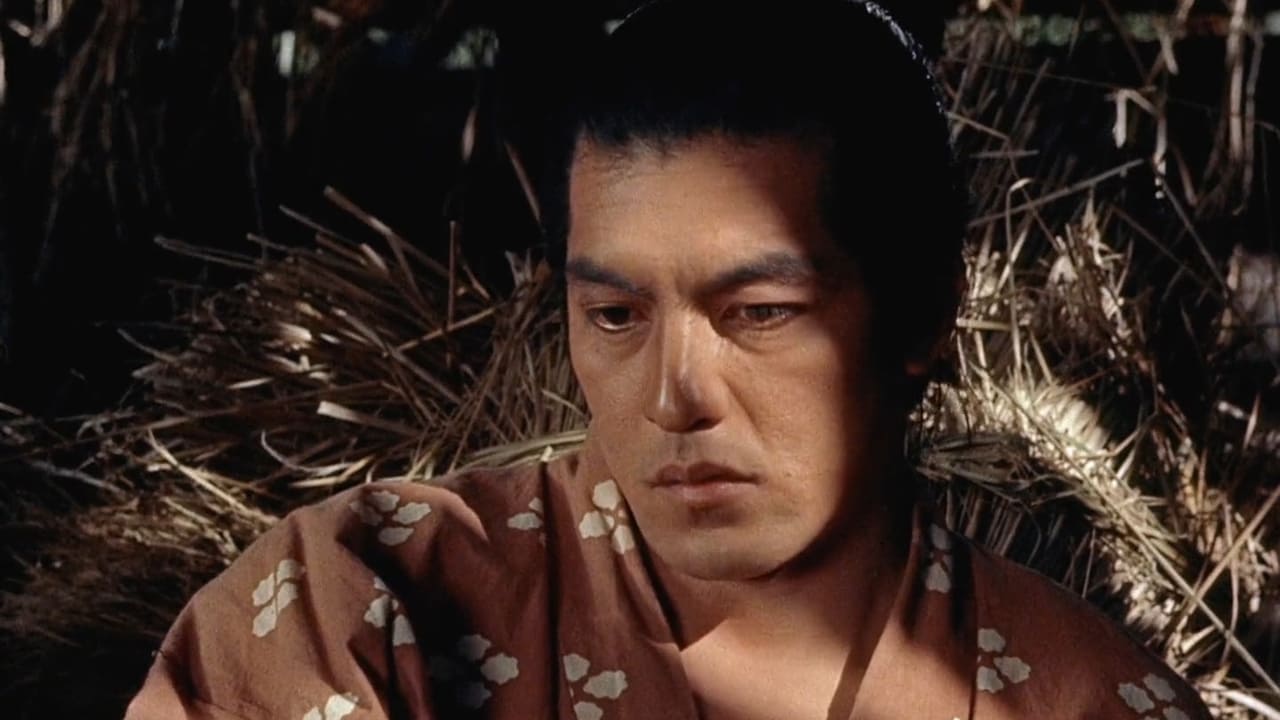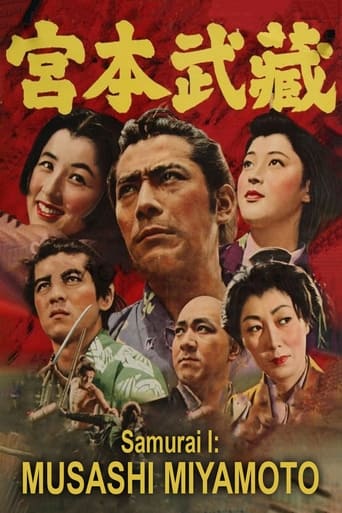



Wow! Such a good movie.
An action-packed slog
A lot of perfectly good film show their cards early, establish a unique premise and let the audience explore a topic at a leisurely pace, without much in terms of surprise. this film is not one of those films.
View MoreThe tone of this movie is interesting -- the stakes are both dramatic and high, but it's balanced with a lot of fun, tongue and cheek dialogue.
View MoreAn influential picture of a legendary character. The director precedes Akira Kurosawa and provides the template that is expanded upon by the latter film director. I believe that Kurosawa films are essential for any film lover, but if you fall for well done samurai movies, than this is a must see film. The characters, storytelling and camera techniques are incredibly well done for those who appreciate the historical development of films. This film came out at the same time as Seven Samurai and won the Academy Award for best foreign film. Musashi is a Japanese seventeenth century folk hero who has been depicted in numerous art forms throughout Japanese history.Toshiro takes on the role with complete mastery. It begins with him up on a tree idolizing the marching warriors through his small village. He goes off to war to make a name for himself. His childhood friend decides to follow along despite his engagement to Otsu. In war they encounter defeat and escape to improve. They meet a mother and daughter out in the country who help them heal. Ultimately, Musashi separates from his friend and returns to his town where he becomes a fugitive.As part of a trilogy, this film sets up the stage for the next two, but it also stands very much on its own. Musashi begins as an impetuous young man and the film ends when he has matured. One drawback is that we only get glimpses into the character over long periods of time. Musashi comes off as an intense character, obsessed with fame, even over the company of women. His treatment of women appears to be an honorable characteristic or it could be a reality for someone who has not properly developed certain social skills. There is a certain sympathy that the viewer develops with regard to such a character where fame at all costs stunts the quintessential human drive for companionship and friendship. He becomes a loner that no one can access. The character development from a naive beginning with indiscriminate fighting to a mature more restrained character is engaging. In this film you also have the love triangle that will continue through the subsequent films.The director Inagaki captures incredibly well the local country side scenery full of beautiful mountains. The most memorable scene is when Musashi is hung from a tree by the Zen monk as a way of teaching a lesson. The Zen monk is a memorable character, but I wished that more could have been developed with the Japanese Zen background context. Ultimately, Musashi emerges as a confident man ready to accomplish his goal of becoming a samurai with a better structured agenda. On the side, the viewer is left to contemplate the fates of Otsu, and Musashi's friend Matahachi. A great film that looks into the character side of Musashi whereas the next two installments will make great use of traditional samurai duels.
View MoreKurosawa regular Toshiro Mifune stars as an unfocused ball of furious youthful energy in this first installment of the famed Samurai Trilogy. As Takezo, the adopted black sheep of a small feudal village, Mifune is wild, passionate and unfocused in his quest for adventure and respect. Seeking a romanticized status as samurai, he rushes off to join the losing side of a civil war, enticing his best friend to tag along in search of similar fame and fortune. What follows is a broad adventure across the landscapes of Japan, chance encounters with a colorful batch of faces, and an awful lot of unresolved plot threads. As can be expected with the first act of any saga, there isn't much finality to be found here; it really seems as though we're only beginning to scratch the surface when the curtain drops, and that compete lack of closure left me feeling a touch jilted, justifiably or not. Later chapters have a wealth of storytelling riches to expand upon, though, with two rebellious youths beginning to come of age in vastly different ways, a fistful of foils closing in on each, an unresolved love triangle muddying the waters and a clear-cut destination on the horizon. On its own, this is little more than an incomplete tease. In the context of a three-film arc, though, it's much more digestible as a rich, diverse pin-setter. I want more.
View MoreAlthough this is a samurai movie, story is far more than just sword fights. Musashi Miyamoto is perhaps the most famous swordsman in Japan. He starts from a humble beginning to become the best sword fighter in Japanese history. Based on a novel by Eiji Yoshikawa, the first chapter of Musashi trilogy focuses on seminal years of Musashi as he grows up as Takezo Shinmen in the village of Miyamoto. He's rambunctious youth that needs discipline and education. He receives his first lessons from monk Takuan. He also meets the love of his life Otsu, his childhood friend Matahachi, and Akemi.There's dignity, and consideration for other human in Musashi. The caliber of people living a humble life around him seems to have dignity and innocence that's not seen these days. As a society, we are definitely going down hill compared to the times this movie was made.You get to see very young Toshiro Mifune , Kaoru Yachigusa, and Mariko Okada in their prime delivering their A list performances.A very classy film that's worth watching.
View MoreOne can watch this film and learn a lot. The philosophy woven throughout, mainly by the Priest Takuan (Kuroemon Onoe), about what it means to be a man and honor your family (community) is the hidden jewel of this film.Takezo (Toshirô Mifune) represents all the rebellious youth that only think of themselves. He cares nothing for the damage he does. To the entire village, he is a dangerous animal. But, the Priest finds that he is worthy of rehabilitation and proceeds to make him into a Samurai warrior in service to the castle.This is a slow and thoughtful film, full of swordplay for those looking for that, but it is so much more for those who take the time to discover it.Kaoru Yachigusa plays Otsu, who is abandoned by her fiancé (Rentaro Mikuni) and falls in love with Takezo. Unfortunately, his training, after she waits for him for three years, has only begun as he begins a journey across Japan to get in touch with the people.I can't wait to see the next installment of this trilogy, which is cinematically brilliant, as one would expect from a Criterion disk, and features outstanding acting from all concerned.
View More